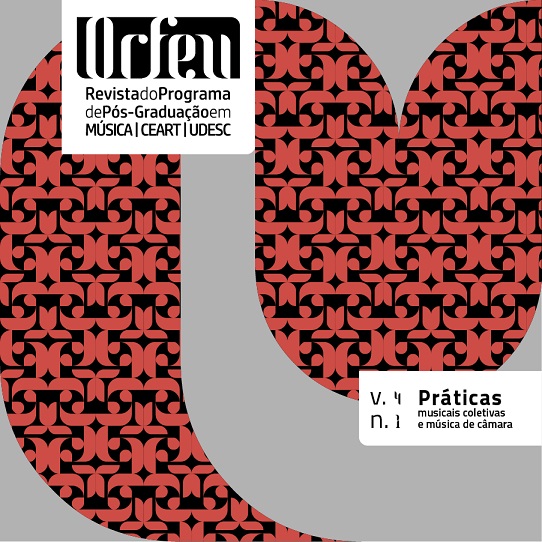The modinha as a social collective phenomenon from an Andradian perspective and its poetic analysis
DOI:
https://doi.org/10.5965/2525530404012019082Keywords:
Modinha, collective, tradition, Brazilian culture, Mário de AndradeAbstract
This paper focuses on the analysis of the Brazilian song called Modinha as musical historical research to improve an understanding of Brazilian contemporary society, with the bibliography of Mário de Andrade. It is also aimed to draw a parallel between this music of Imperial Brazil and Brazilian popular music of the twentieth century and the present day, looking for examples of composers and performers who have maintained the tradition of Modinha, and songs with similar social collective functions as the samba-song of the 1930s. In this way, the results were achieved through analyzes poems and lyrics of Modinhas, relating them to their historical contextualization, enabling a survey of the social groups that produced them and the continuity of the tradition in posterity. The analysis of Mário de Andrade´s “Viola quebrada” made possible to contextualize the research on Ethnomusicological survey, regarding Brazil as a country that was appropriated by the Portuguese without being considered with its particular features, and how this metaphor is employed poetically.
Downloads
References
ANDRADE, M. de. A divina preguiça. A Gazeta, São Paulo, 28 nov. 1918.
ANDRADE, M. de. A situação etnográfica no Brasil. Jornal Síntese, Belo Horizonte, out. 1936.
ANDRADE, M. de. Notas diárias. Mensagem, Belo Horizonte, 24 jul. 1943.
ANDRADE, M. de. Música, doce música. São Paulo: Martins, 1963.
ANDRADE, M. de. Modinhas imperiais. Belo Horizonte: Itatiaia, 1980.
ANDRADE, M. de. Macunaíma. São Paulo: Klick, 1999.
ANDRADE, M. de. Pauliceia Desvairada. São Paulo: Ciranda Cultural, 2017.
ARAÚJO, M. de. A modinha e o lundu no século XVIII. São Paulo: Ricordi, 1963.
BLACKING, John. How musical is man? Washington: Washington Press, 1973.
CARLINI, A. Cantem lá que gravam cá. 1994. 467 fls. Dissertação (Mestrado) – Universidade de São Paulo, São Paulo, 1994.
CASCUDO, L. da C. Dicionário de folclore brasileiro. São Paulo: Global, 2000.
CENTRO CULTURAL SÃO PAULO. “Eu sou trezentos, sou trezentos-e-cincoenta”: uma “autobiografia” de Mário de Andrade. São Paulo: Prefeitura Municipal de São Paulo, 1992.
CENTRO CULTURAL SÃO PAULO. Cantos populares do Brasil: a missão de Mário de Andrade. São Paulo: Prefeitura Municipal de São Paulo, 2007.
FREYRE, G. Casa-Grande e senzala. Rio de Janeiro: J. Olympio, 1983.
HOBSBAWM, E. História social do Jazz. Tradução de Ângela Noronha. São Paulo: Paz e Terra, 1996.
HOLANDA, C. B.; GUERRA, R. Calabar: o elogio da traição. São Paulo: Círculo do Livro, 1973.
HOLANDA, S. B. Raízes do Brasil. Rio de Janeiro: J. Olympio, 1981.
IKEDA, A. T. Música política: imanência do social. 1995. 314 fls. Tese (Doutorado) – Universidade de São Paulo, São Paulo, 1995.
LOPEZ, T. P. A. Mário de Andrade: ramais e caminho. São Paulo: Duas Cidades, 1972.
KIEFER, B. A modinha e o lundu: duas raízes da música popular brasileira. Porto Alegre: Movimento, 1986.
MARRAS, S. O fado tropical de Gilberto Freyre. Cult, São Paulo, mar. 2000.
MATHIAS, A. Fina estampa. Folha de S.Paulo, São Paulo, 29 ago. 2004. Caderno Mais.
MENDES, A.; RONCARI, L.; MARANHÃO, R. Brasil história: texto e consulta. Vol. 2: Império. São Paulo: Brasiliense, 1983.
PINTO, Tiago de Oliveira. Questões de antropologia sonora. Revista de Antropologia, São Paulo, v. 44, n. 1, p. 221-86, 2001.
ROUSSEAU, J. J. Emílio ou Da educação. Tradução de Sergio Milliet. Rio de Janeiro: Bertrand Brasil, 1995.
SANCHES, P. A. Era uma vez uma canção. Folha de Paulo, São Paulo, 29 ago. 2004. Caderno Mais.
SILVA, L. N. P. Mário universal paulista: algumas polaridades. São Paulo: Secretaria Municipal de Cultura, 1997.
TINHORÃO, J. R. Pequena história da música popular. Petrópolis: Vozes, 1975.
TONI, F. C. A música popular brasileira na vitrola de Mário de Andrade. São Paulo: Senac, 2003.
Downloads
Published
How to Cite
Issue
Section
License
Copyright (c) 2019 ORFEU

This work is licensed under a Creative Commons Attribution 4.0 International License.
Authors who submit their manuscripts to be published in this journal agree to the following terms:
1. Authors retain the copyright and grant to the journal the right of first publication, whilst simultaneously permitting their work to be licensed under the Creative Commons License Attribution, which allows the sharing of work with recognition of the authorship and initial publication in this journal.
2. Contributions in this journal are open access; this means they are based in free use, and non-commercial applications.






